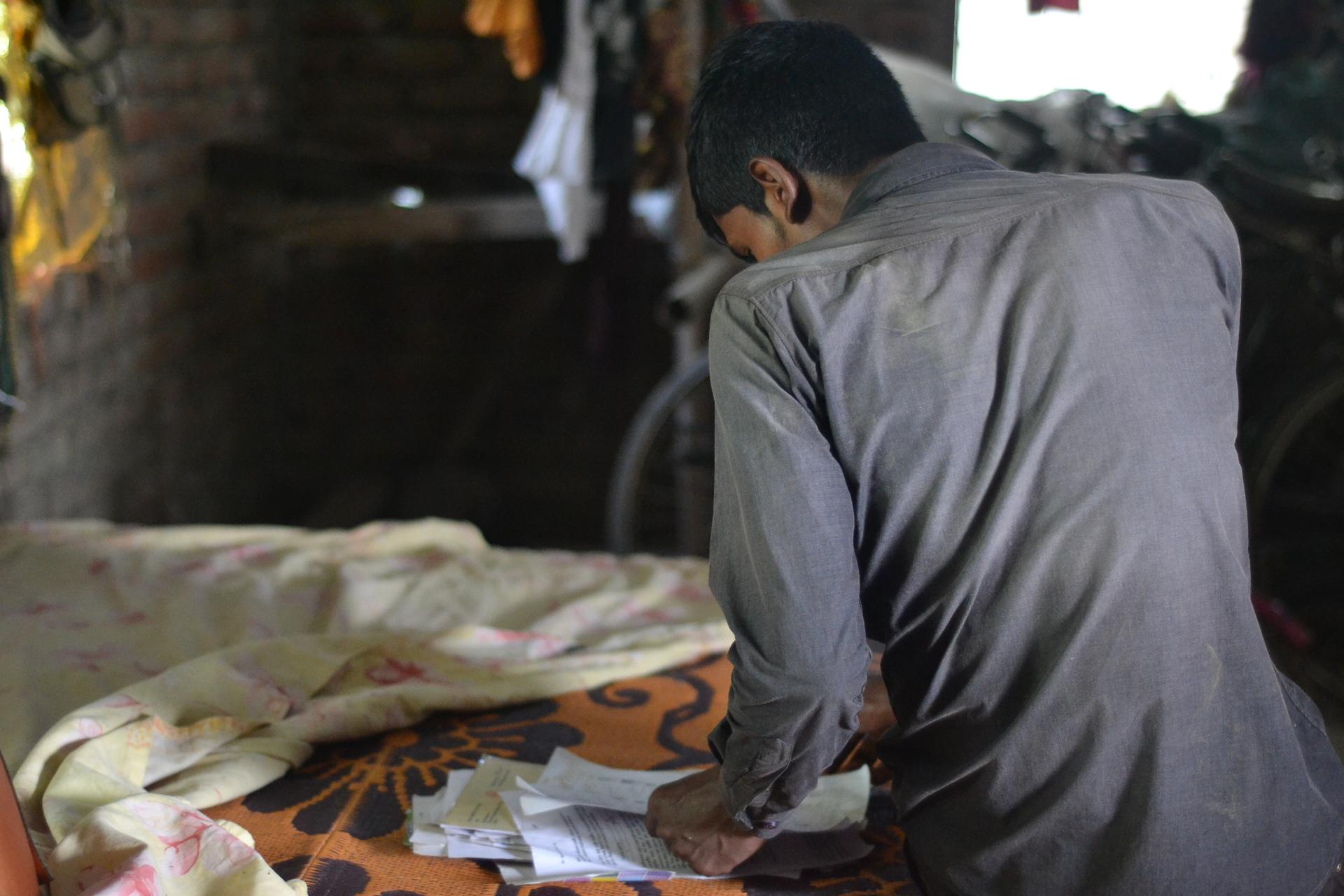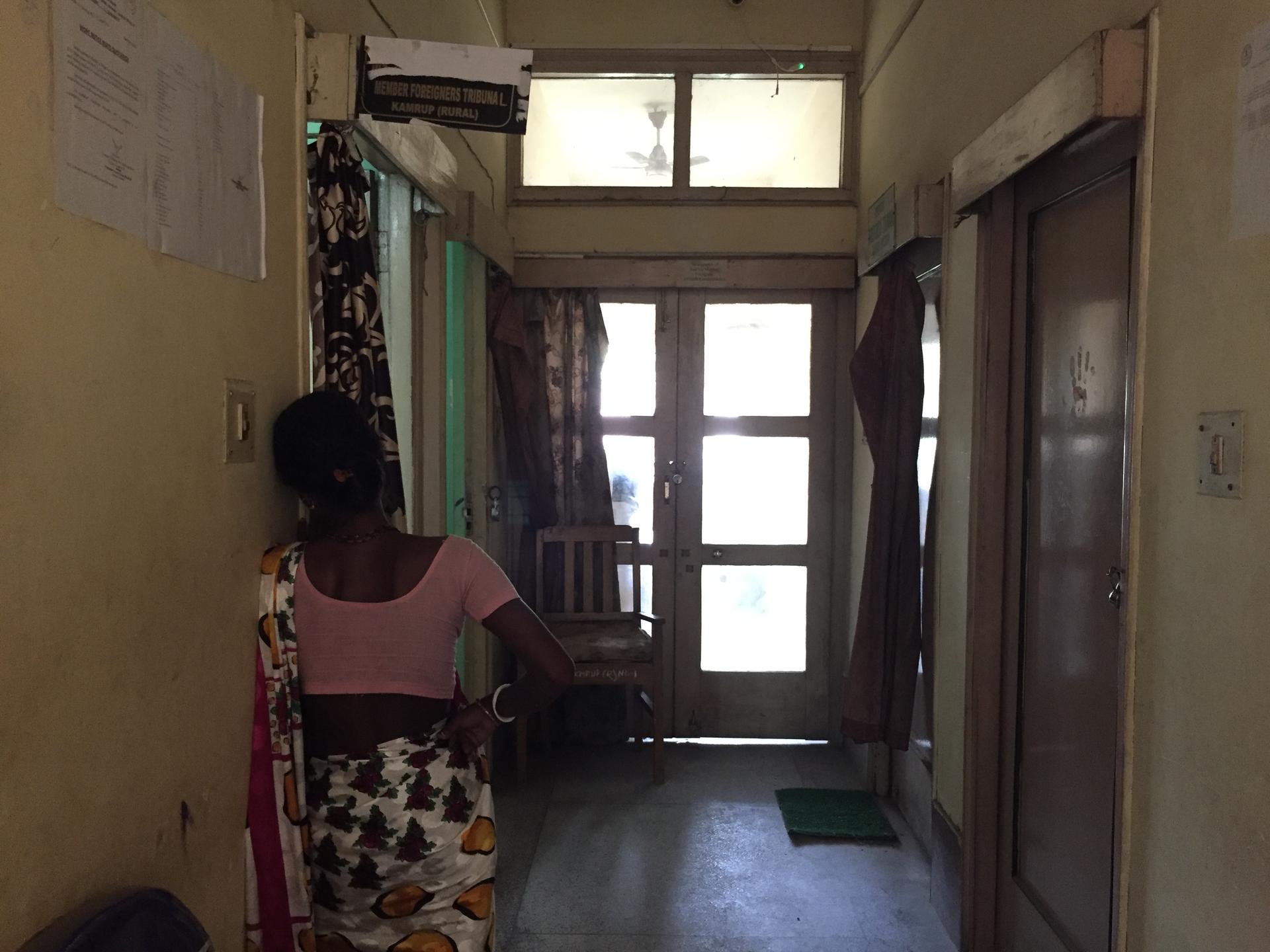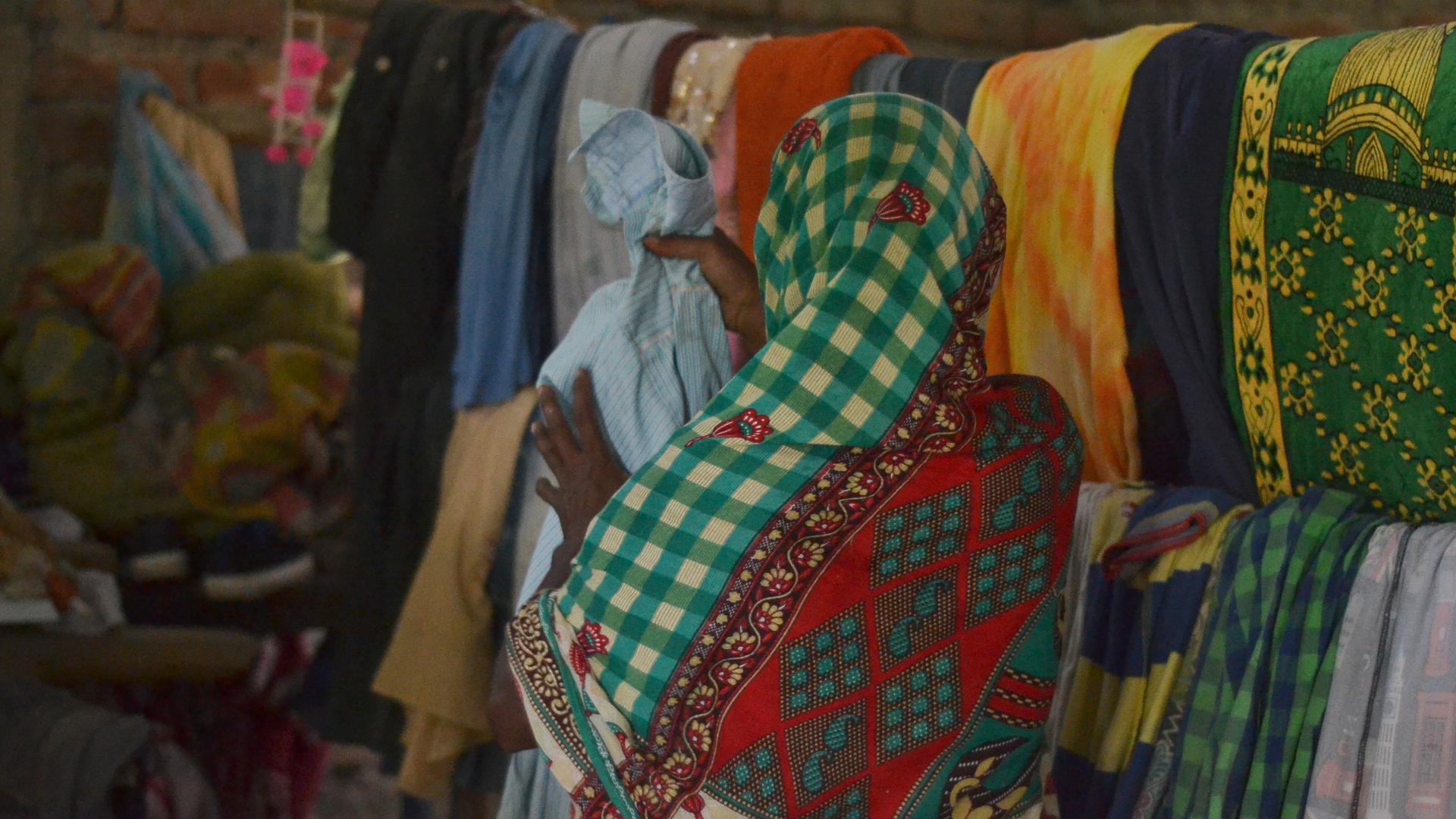Thousands of Bengali women must prove their Indian citizenship or face statelessness. Most can’t.
Fatima Begum performs household work at her home in Barepta district of Assam, India. A Bengali Muslim born in Assam, she was first declared a foreigner in 2013 and her case is currently pending in the Supreme Court of India.
Every night, Fatima Begum leaves her brick-and-bamboo home located near a tributary of the Brahmaputra River in India’s northeastern Assam state to seek refuge with neighbors. In the morning, she returns home to her family, but spends the day watching for unexpected guests, ready to flee.
As a Bengali Muslim living in Assam, which shares a border with Bangladesh, Begum is among thousands accused of foreigner status after the government established 100 foreigners’ tribunals and a specialized border police force tasked with identifying “illegal immigrants.”
In 2010, local authorities began to suspect Begum of being a “doubtful voter,” or D-voter, and asked to provide citizenship documents. Over two years later, a government tribunal declared her a “foreigner.”
Since then, she has lived in constant fear of detention. Her name has been changed to protect her identity.
“I am always tense and worried. It will be better if I die.”
“I am always tense and worried. It will be better if I die,” she said. Her husband and grown children remain supportive and so do her neighbors, but all feel helpless in Begum’s case.
Begum, a mother of seven, does not know her exact age or birth year but says she was born in a village in Assam. She married as a teen and never went to school; she cannot read or write. She has moved several times in the last 25 years. She speaks Bengali instead of Assamese, the language claimed by the state as integral to its identity. Many women living in chars, or river islands, spread across 2,300 villages, in rural parts of Assam, share similar backgrounds.
Related: India is trying to market its elections as a tourist attraction
After being declared a foreigner in 2013, Begum began to present herself at the local police station almost every month, risking her life to swim across the river during heavy rains and floods. She says police officers have asked her for bribes and estimates having spent a total of more than $2,200 in her case so far — a large sum for the family that relies on fishing and wage labor for its income.
Assam has about 120,000 so-called D-voters, those who are suspected of foreigner status which bars them from their electoral rights. Begum is among almost 92,000 people officially declared as foreigners in the state as of 2018.
This means that she and thousands of others will be barred from voting in India’s 2019 General Election, a multi-phase electoral process that began on April 11, 2019, and concludes on May 19, with results anticipated on May 23.
Officials have threatened to detain Begum, but so far, she remains in a state of limbo. The six prisons that serve as detention centers — with one solely for women — are currently filled with around 1,000 detainees who languish in these centers for indefinite periods of time in inhumane conditions. About 25,000 cases remain pending with the tribunals.
A local media report says the women’s detention center holds over 150 women in Kokrajhar, nearly 124 miles from the state capital, Guwahati.
“The female detainees have lived in a small, confined space for close to a decade.”
Harsh Mander, former special monitor for minorities at the National Human Rights Commission, visited the women’s detention center in January 2018 and noted that detainees were forbidden to communicate with family members and were also denied parole and wage work.
The female detainees have lived in a small, confined space for close to a decade, he said. Most have had no legal help whatsoever. Female “inmates wailed continuously, as though in permanent mourning,” he wrote in Scroll, an Indian daily.
Assam has received a steady influx of migrants since as far back as the 19th century from East Bengal, Bihar and other parts of colonial British India who were brought in to work as cheap labor in tea plantations. A wave of migration during the India-Pakistan partition in 1947 led to Assam’s crackdown on undocumented immigrants for decades, citing threats to local employment, culture and identity.
Around 10 million people fled to Assam for safety during Bangladesh’s war of independence in the early 1970s. In 1985, following student-led anti-immigrant protests in which hundreds were killed, the government signed an accord declaring that anyone who entered Assam without Assam-specific documents after March 24, 1971, would be deemed a foreigner.

‘No proof to support identity’
In 2015, following a Supreme Court order, Assam began to update their National Register of Citizens (NRC), which requires all 34 million residents of Assam to prove their citizenship. The government is conducting this vast and complex process — unique to Assam — for the first time in six decades. The end result could threaten to render millions of refugees, immigrants and citizens like Begum stateless.
Related: Is WhatsApp tipline to fight fake news in India enough?
Bangladesh maintains that illegal immigration and mass deportation is an internal issue for India, and there is currently no agreement regarding Bengali Muslims and Hindus deemed foreigners in Assam.
When the government released the first NRC draft in December 2017, it omitted the names of 2.9 million married women — most from lower Assam, home to a large Bengali Muslim community. They endured a strict verification process to decide their citizenship.
Subsequent NRC drafts have been released periodically amid growing hostility toward Muslims in the country and under a newly elected state government formed by Prime Minister Narendra Modi’s Bharatiya Janata Party.
The results have caused much uproar and concern about the authenticity of the process and discrimination against certain communities, like minority Bengali Muslims, as well as Bengali Hindus, often perceived as foreigners.
A significant number of declared D-voters are married women from marginalized rural communities who are especially vulnerable, said Parvin Sultana, an assistant professor in the political science department of Assam’s Pramathesh Barua College.
“Lack of education, awareness, poverty, and a larger patriarchal structure has rendered many women invisible, and when the state started enumerating, they had no proof to support their identity.”
“Lack of education, awareness, poverty and a larger patriarchal structure has rendered many women invisible, and when the state started enumerating, they had no proof to support their identity,” Sultana said.
Tribunals governed under the Foreigners’ Act in India place the burden of proof on the individual to provide documentation of theirs or their ancestors’ residence in the country before 1971, the year Bangladesh was established.
For women like Begum who hold no certificates, and whose names appear in the voters’ list alongside their husbands, proving ancestry is difficult. Villages usually issue certificates to prove their father’s name, but in most cases, it’s not enough.
“Muslim women are victimized more because a difference in name often leads one to be marked as D-voter,” Sultana added. “For instance, Samina Begum becomes Samina Bibi once she gets married and Samina Bewa once she is widowed. This inconsistency is reflected in voters’ lists and not considered by tribunals.”
The government tribunal cited Begum because she lacked a clear record of documentation and was declared a foreigner in a hearing that occurred in her absence, without any cross-examination.
Begum’s village certificate, voters’ list, and electors’ photo ID card weren’t enough to prove her citizenship. Her father’s name as it appeared on the voters’ list of 1970 was deemed invalid because of a typographical error.
The foreigners’ tribunal and high courts noticed discrepancies between Begum’s matrimonial home, birth address, and listed voter address. She also moved several times due to erosion and unemployment. When Begum mentioned a different age in her statements from what appeared in documents, these inconsistencies also complicated matters.
“The court does not take into consideration these small things. They behave as if a criminal trial is going on.”
“The court does not take into consideration these small things. They behave as if a criminal trial is going on,” said Anas Tanwir, Supreme Court lawyer representing her case on a pro-bono basis in the highest court in Delhi after the state’s High Court dismissed it, first in 2014 and again in 2017.
“If she has provided 10 documents, the court cannot pick up one document and say that there is a problem with this and therefore she is not an Indian citizen,” Tanwir said.
Tanwir also points to a gross lack of due process for women like Begum.
“The court went on the premise that the documents she has submitted are not sufficient. She should be provided that information during the process rather than at the declaration so it allows her to get more documents,” he added.
Begum missed several hearings because her tribunal lawyer did not keep her informed and updated, she says.
The government released the final NRC draft on July 30, 2018, and left out the names of over 4 million people — mostly women and children, according to reports. An NRC official in charge of multiple villages told a national daily that 80% of women who provided proof of village-issued lineage certificates were rejected in his purview alone.
Begum was surprised to find her name in the final NRC draft, along with those of several family members, but officials quickly informed the media that names of declared foreigners like Begum and those whose cases were still pending would be deleted.
‘I was born here’
Still, Begum’s lawyer Tanwir remains hopeful. And Begum is not alone in her state of limbo.
Poloma Das, 29, also faces a citizenship dilemma. Her name has also been changed to protect her identity. The border police suspected her of being a foreigner last year and since then, her health and finances have suffered.
“I was born here, I have spent my entire life in Assam, but they won’t believe me. I don’t know why this is happening.”
“I was born here, I have spent my entire life in Assam, but they won’t believe me. I don’t know why this is happening,” she said.
Das, a Hindu of Bengali origin, now has to appear at a foreigner tribunal. She traveled for about four hours with four of her relatives and the village development board secretary for the cross-examination in Guwahati, the capital. Das borrowed a white-and-pink Indian saree from her aunt, slippers from her cousin and about $60 from a neighbor.

At the tribunal, Das prepared her mother for the cross-examination, repeating her date of birth and age as printed on her documents to ensure that her mother does not make a mistake.
“Going to court and facing cross-examination is not easy. If she or her relatives inadvertently make one wrong statement, she could be declared a foreigner.”
“Going to court and facing cross-examination is not easy. If she or her relatives inadvertently make one wrong statement, she could be declared a foreigner,” said Aman Wadud, an Assam-based lawyer who has provided legal assistance to Begum, among many others.
Das leaves her two young children at home every day to seek out work as a domestic helper or daily wage laborer to cover the cost of the trial and to support her family. She has not yet spent time in a detention center but she lives in constant fear that the final NRC list may not include her name.
“What happens when the mother, who is the fulcrum of the family, is put in detention?” Tanwir asked. “Can a mother be deported to Bangladesh leaving her family on this side of the border?”
Editor’s note: An earlier version of this story misstated the dates of the Indian election.
Our coverage reaches millions each week, but only a small fraction of listeners contribute to sustain our program. We still need 224 more people to donate $100 or $10/monthly to unlock our $67,000 match. Will you help us get there today?
